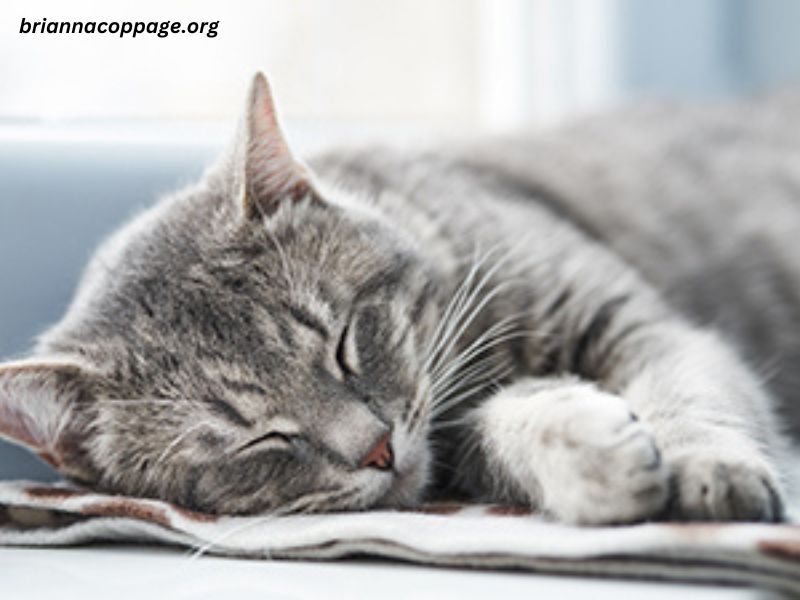Cats, those enigmatic and graceful creatures, have captivated humans for millennia. They are known for their independent nature, playful antics, and—let’s face it—excessive sleeping habits. One claim that often circulates is that cats sleep 75% of their lifetime, and while this might sound exaggerated, it’s based on some truth. To understand the reality behind this claim, it’s important to examine the factors that influence a cat’s sleep patterns, how much sleep they actually get, and why sleep is so vital for them.
The Myth of 75% Sleep
The idea that cats spend 75% of their lives sleeping is an estimate that has become widely accepted. However, in truth, this figure can vary depending on factors like age, activity level, breed, and health. While it’s difficult to measure the exact percentage of time a cat spends sleeping over the course of its life, it is true that cats sleep a large proportion of the day.
An adult cat typically sleeps anywhere from 12 to 16 hours a day, with some cats even reaching 20 hours in a 24-hour period. Kittens, older cats, and particularly sedentary or sick cats may sleep even more. This could bring their daily sleep total to around 70-80% of the day. However, this is not quite as high as the 75% lifetime figure, as cats’ sleep needs decrease with age and increase again during certain life stages.
How Much Do Cats Sleep?
To understand how sleep fits into a cat’s life, we need to break down how much they sleep during different phases of their lives.
- Kittens (0-6 months): Kittens are known for their endless energy, but they are also notorious for napping constantly throughout the day. Newborns sleep even more, sometimes up to 90% of the day, as their bodies are growing and developing. However, once kittens start becoming more active and exploring the world around them, their sleep time decreases to about 18-20 hours a day.
- Adult Cats (1-10 years): A healthy adult cat, on average, sleeps between 12 and 16 hours a day. The amount of time a cat spends asleep depends largely on its personality and lifestyle. Active outdoor cats may sleep less because they spend a lot of their waking hours hunting, exploring, or interacting with humans. On the other hand, indoor cats, particularly those who are less stimulated, may sleep the full 16 hours and beyond.
- Senior Cats (10+ years): As cats age, they may begin to sleep even more. Older cats often sleep 18-20 hours a day, particularly if they are less physically active or have health issues that make them less mobile. Older cats may also sleep more as a way of conserving energy and dealing with the physical strains of aging.
The Science Behind Cat Sleep
To understand why cats sleep so much, it’s essential to look at their biology. Cats are obligate carnivores, meaning their diet requires them to consume meat, which provides them with the nutrients they need to survive. Hunting is a high-energy activity, and to conserve energy for this purpose, cats evolved to sleep more than most other mammals.
Here are some key scientific reasons why cats sleep so much:
- Energy Conservation: Cats’ natural behavior is to hunt and stalk prey. Although domestic cats no longer need to hunt for food, their evolutionary instincts remain intact. Cats are predators by nature, and hunting—whether in the wild or through play—requires bursts of energy. To recharge after exerting energy in this way, they take long naps throughout the day.
- Polyphasic Sleep: Unlike humans, who generally follow a monophasic sleep cycle (one long period of sleep per night), cats are polyphasic sleepers. This means they have multiple periods of sleep throughout the day and night. Cats tend to sleep in cycles, often napping for short periods of 15-30 minutes, then waking up to explore, play, or eat.
- REM Sleep: Cats experience rapid eye movement (REM) sleep, which is a phase of deep sleep where dreaming occurs. REM sleep is essential for brain function, memory consolidation, and overall health. Cats typically go into REM sleep during their longer naps. This helps to explain why they sleep so much—REM sleep is not only vital for physical recovery but also for maintaining cognitive function.
- Health and Comfort: Cats are creatures of comfort. In the wild, they may rest during the hottest part of the day to conserve energy. Domestic cats have retained this instinctual need for comfortable, safe places to sleep, which is why they often seek out cozy corners, blankets, or sunny spots. The comfort factor contributes to how much time cats spend in a restful state.
Why Do Cats Sleep So Much?
There are several reasons behind a cat’s prolonged sleep patterns, most of which are related to their evolutionary needs, health, and lifestyle.
- Instinctual Behavior: As mentioned, cats are natural predators. In the wild, they would spend hours stalking prey, then rest to conserve energy before the next hunting opportunity. Although domestic cats are fed regularly, they still retain the same need for energy conservation. Even without hunting, domestic cats retain the instinctual behavior to sleep for long periods.
- Environmental Factors: Cats are most active during dawn and dusk, as these are the times when their prey is most likely to be active. In modern homes, this translates to a cat being more active in the early morning or evening hours and sleeping more during the daytime. This pattern aligns with the cat’s natural hunting habits, but with the modern conveniences of being indoors, there’s less need to maintain constant vigilance.
- Recovery and Rest: Just like humans, cats need adequate sleep for physical and mental recovery. When a cat sleeps, it allows its body to rest and repair itself. This includes the muscles, organs, and immune system. Sleep is a restorative process, helping to keep the cat healthy, agile, and mentally sharp.
- Age-Related Changes: Cats, like people, sleep more as they age. Older cats have reduced stamina and might not be as interested in active play. Their bodies also need extra rest to compensate for wear and tear. The increased need for sleep in senior cats is a sign of aging, just as it is for humans.
Do All Cats Sleep the Same Amount?
While it’s common for cats to sleep for the majority of the day, the amount of sleep a cat gets can vary based on several factors:
- Breed: Some cat breeds, such as the Ragdoll or Persian, tend to be more relaxed and docile, leading them to sleep more than more active breeds like the Abyssinian or Bengal. High-energy breeds might need more stimulation and may sleep less than others.
- Personality: Just as people have different sleep needs, so too do cats. Some cats are naturally more active, playful, or curious, and therefore may spend less time sleeping. Others are more sedentary and might enjoy long naps throughout the day.
- Health: A cat’s health can significantly influence its sleep patterns. Cats with health conditions like hyperthyroidism, arthritis, or kidney disease may sleep more due to physical discomfort. On the other hand, cats with behavioral problems or anxiety might have difficulty resting.
Conclusion
While the claim that cats spend 75% of their lives sleeping is somewhat of an exaggeration, it’s true that cats sleep a large portion of their day—typically between 12 and 16 hours. This sleep is essential for their overall health and well-being, allowing them to recharge after bursts of activity and engage in their natural predatory behaviors. Whether they are kittens, adults, or seniors, cats are programmed to sleep in a way that helps them stay healthy, mentally alert, and physically fit. So, the next time you find your cat napping in a sunny spot, know that this is just one of their many ways of maintaining balance in their lives.






